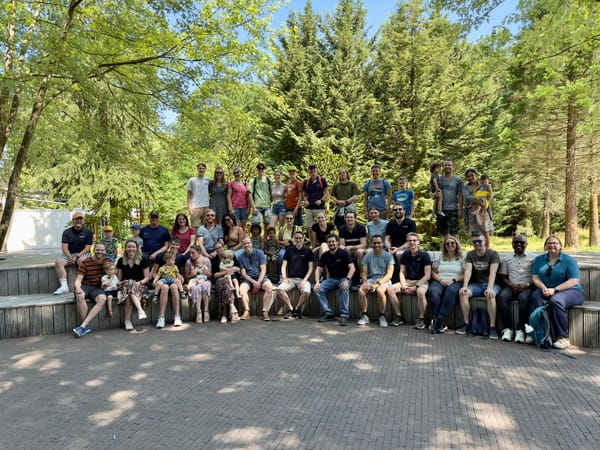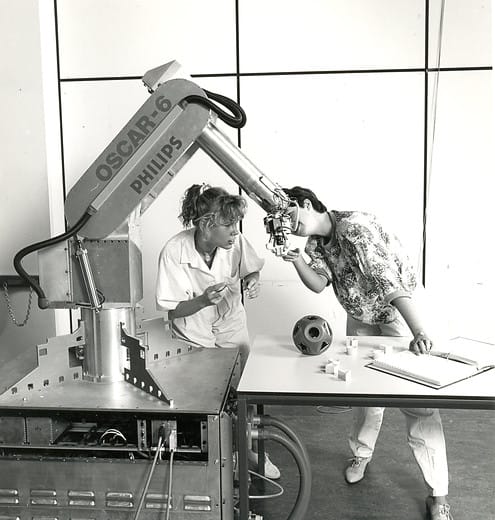The Disgraced Father: An ode to the hero of Computer Science

The legend Feynman, the nightmare Laplace
A physics student generally likes to talk about his heroes. It usually does not take long for an enthusiastic member of Arago to completely overwhelm you with facts about Feynman. You’ll hear about his eccentric personality and his contributions to the world of Physics (something I myself am completely unfamiliar with, by the way) in all colourful details. However, this phenomenon is not limited to Physics. Most fields of science have their heroes and icons. The average mathematician cannot help but feel a certain sense of hype at the words Euler and Gauss. Even studies like electrical engineering, despite their “practical” approach to the subject matter, deal with dozens of founding fathers of their field, in the form of theories and formulas named, without further inspiration, after their respective inventors. What electrical engineering student doesn’t cringe when he hears the word Laplace?
However, this phenomenon that I would like to call the “heroes-of-the-field” seems absent in computer science. I’m sure the average TCS student will have had some history of computer science, but only what could be considered the bare minimum. Then there is the average BIT student, where the history, philosophy and people behind computer science matters even less. This is an incredibly unfortunate phenomenon, precisely because our beautiful field of computer science is rich in many spiritual fathers, mothers and heroes. So, I thought it would be a good gesture to put one of these individuals in the spotlight for my debut article in the I/O Vivat.
Computer science has never existed in a vacuum. Because of our tendency to limit our vision to what we see in front of us on our screen, we sometimes forget the great impact our science and work has on the world around us. There was one person to whom this was emphatically clear, the father of modern computer science: Alan Turing.
The Imitation Game
Some of you will now be thinking “Ah, that guy.” Others may be reminded of the movie “The Imitation Game” from 2014. Perhaps there are others to whom the name doesn’t mean anything to at all. For those who have seen The Imitation Game: bravo! You can skip to the last few paragraphs from here. For those who haven’t seen the Imitation Game: I’m probably going to slightly spoil the movie for you.
June 1912. Europe was a significantly different place than it is today. Amsterdam was still a city without electric lights, Germany was an empire, and everyone was talking about the Titanic, which had sunk about 3 months prior. In this Europe, in London, on June 23, Alan Turing was born.
In Turing’s youth, two things were immediately apparent: he had an aptitude for mathematics, other beta subjects and he was extremely athletic. Although he was incredibly good at math, his school didn’t really appreciate this, reasoning that school was no use if you only wanted to do beta science. During this time, he soon became friends with Christopher Morcom and together they would spend hours solving mathematical problems. Unfortunately, Christopher died of tuberculosis at the age of 17. After the death of his best friend, Turing began pondering a whole new question that had occurred to him: what is intelligence and consciousness and how was it connected to matter? This got Alan thinking about the brain as a machine, based on mathematical logic: a computer.
Alan went on to study mathematics at King’s College in Cambridge. After that he studied for a while at Princeton in America, only to return to England, just before the outbreak of World War II in 1939.
Cyberwarfare
Almost immediately after the outbreak of war, Turing went to work for the British Intelligence Service, as a decoder at Bletchley Park. Here he set about decoding messages that Nazi Germany was sending around in order to stay one step ahead of them.
Turing, along with his team, developed several computers capable of translating the Nazis’ secret language: the so-called Enigma code. The highlight was when he managed to translate the messages from the German submarines, allowing the British army to be one step ahead of the German navy; something that was crucial for supplying the island country. Later Winston Churchill would state that the only thing that ever had him worried during the war, was the phenomenal German submarine force.
After the war, Turing was awarded a position in the Order of the British Empire, but this was to remain a secret. It was calculated that his actions were so instrumental in the end of the war, that he caused the war to end 2 years earlier. It is no understatement that Turing saved thousands, if not millions of lives with his mathematics and computers.
Turing was a hero after the war. It seemed like nothing could go wrong; he was obviously a hero. However, this all turned out to be short-lived. After World War II, a new era of war began: a cold war. Turin was arrested several years after the war. The reason? He was homosexual.
Disgraced Genius
Turing was found “guilty” of homosexuality. Besides the fact that at this time homosexuality was outlawed in England, people speculated that the Soviet Union might have used this to blackmail him. He was given two options by the judge: either he had to go to jail, or he would be released on the condition that he would be chemically castrated with hormone therapy. Turing chose the latter. This is where his downfall truly reached its high point. The hormone therapy, aimed at making him impotent, had terrible effects on him. In addition to all this, he was fired from all his positions and the rumours that he was being blackmailed by the Soviet Union grew louder. On June 7, at age 41, he was found in his home by his housekeeper. He had died of cyanide poisoning and an investigation determined suicide as the cause of death. A man who contributed so much to computer science and saved thousands of lives died disgraced in his own home.
Artificial Intelligence, Anno 1936
Turing’s contributions to computing are also still incredibly relevant in our time. Are we at the forefront of a new paradigm? Looking around us, A.I. is spontaneously everywhere. What for decades was a theoretical topic with only a few practical applications is now more than reality: A.I. art programs such as Dalle-E and the open-source Stable Diffusion seem to be able to generate art that is indistinguishable from the real thing. Software such as ChatGPT gives the impression that you are conversing with a real person. However, the concept of A.I. and certainly talking to a robot is not a new phenomenon. Here, too, Turing was a pioneer.
Creating life and attributing life to non-living objects has always been a fascination of man. Look, for example, at our ancestors who attributed anthropomorphic characteristics and intelligence to mountains, trees and rivers. Therefore, it shouldn’t come as a surprise that we have a fascination with artificial intelligence. In 1818, Mary Shelley wrote about Dr Frankenstein, whose scientific experiments enabled him to create life. When he finally saw what he had created, he felt tremendous regret. Had he gone too far? Unlike Mary Shelley, Turing’s interest in creating life was a lot more practically oriented: Turing mainly wondered when something could be considered life, intelligence or simply actual thinking. As such, the more advanced computer scientists among you will probably be familiar with the Turing test.
The Turing test was drafted by Turing in 1936 but was elaborated on in his 1950 paper “Computing Machinery and Intelligence.” The Turing test can be summed up in the imitation game (not the movie, the thought experiment):
In the imitation game, a man and a woman must engage in conversation without being able to see each other. The man must pretend to be a woman, while the woman tries to prove that the man is not actually a woman. In the middle of the experiment, the man is switched with an artificial intelligence (e.g., a chatbot). If it remains just as difficult to unmask the man (now a robot), the artificial Intelligence has passed the Turing Test. In short, if you cannot say with certainty that you are talking to a robot, according to Turing, the robot is “intelligent.”
One of the articles in this I/O Vivat was written by ChatGPT. What makes this article different from one written by a flesh-and-blood human being? Perhaps your answer will be “Nothing.” And voila: we can conclude that according to the Turing test, ChatGPT is intelligent, as far as we can approximate.
Turing himself claimed that he expected that by the year 2000 computers would have about 100MB of memory and thus pass the Turing test with all ease. In hindsight, this prediction turned out to not be entirely true, but there is no denying that we are making great strides in 2023. Has Turing’s prediction finally come true with software like ChatGPT and developments in Deep learning?
Heritage (of intolerance)
Turing’s life has been invaluable to our field of computer science, as well as to the world at large. Not only would World War II have lasted much longer without Turing, but it could also have turned out completely differently. This man, this Alan Turing, is the father of our field. I believe that is something we can be incredibly proud of and inspired by.
The downside is that we see that even a genius like Turing was not above being a victim of the prejudice and small-mindedness of his contemporaries. We are fortunate today that we live in a more tolerant era, but it is still important for us to stay sharp. We must continue to question whether certain judgments are justified. It is important to remember that science is never isolated, but part of the more complex whole. We too have a piece of responsibility during and after our time in university that we carry with us. How do we shape our place in science.
“We can only see a short distance ahead, but we can see plenty there that needs to be done”
-Allan Mathison Turing




